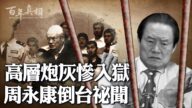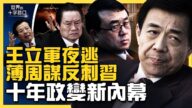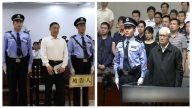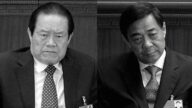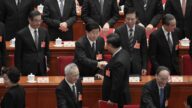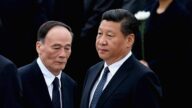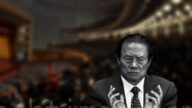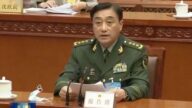【新唐人2014年08月13日訊】中共前中央政治局常委周永康7月29號被當局立案審查後,中共官方至今未提案情。不過,日前有中國大陸社群網站突然刊文披露了周永康3項罪名,並說,中紀委目前已掌握足夠證據給周永康案定性。那麼,在中共「北戴河會議」正在召開的這個敏感時刻,大陸網站漏出周永康的罪名,目地是甚麼?會議最終可能會給周永康定甚麼罪?下面來聽聽專家的分析。
大陸社群網站《凱迪網》,7月29號,刊出《中共中央決定對周永康嚴重違紀問題立案審查》中透露,周永康主要涉嫌三宗罪:一是「貪污腐敗」,就是周永康在曾經任職的地方或部門,如石油系統和四川,大搞權錢交易﹔二是「濫用職權」,指周永康任職政法委書記期間權力擴張,在處理社會群體事件中以鐵腕鎮壓,失去民心﹔三是「挺薄犯上」。
美國「南加州大學」公共政策博士葉科表示,目前,「北戴河會議」正在召開的敏感時期,《凱迪網》網站漏出周永康罪名,顯然是當局「放風試水」。
美國南加州大學公共政策博士葉科:「現在大家對北戴河會議都很關注,那麼周永康案是北戴河會議繞不開的一個結,所以,它現在先放出來,實際上是想先設定一下公共期望,就是對周永康案大概是甚麼樣一個定性。」
《凱迪網》在大陸媒體第一次罕見的用「犯上」罪名,定性周永康,說周永康在2010年3月7號全國「兩會」期間,在免除中共前重慶市委書記薄熙來職位的決定上投反對票,並將中央的處理意見私下通知薄熙來,明顯與中央有「二心」。
葉科:「大家都知道,拿下周永康這個常委,只是貪腐,現在誰都覺得不是很正常,所以,最後的原因,實際上大家都知道,是因為周永康和薄熙來他們在搞政變,但是,中共怕這種分裂對中共衝擊太大,故意縮小了事態,就是比較含蓄的方式來提。」
《自由亞洲電臺》8月6號發表評論說,周永康一案的要害,不在腐敗,而在政治圖謀。因周永康的政治圖謀,讓習近平破了「刑不上常委」的潛規則。
對此,葉科表示贊同。葉科表示,僅以「反貪腐」的罪名來治一個政治局的常委,政治風險太大,而且打擊的面也非常寬。所以拿下周永康的直接原因事實上是因為周永康和薄熙來等想謀反。
不過,葉科指出,現在絕大多數媒體仍然沒有披露周永康、薄熙來政治圖謀或謀反的深層原因。只有大紀元等少數敢言媒體把周永康、薄熙來要搞政變的真正原因說出來了。
葉科:「大家都知道周永康跟薄熙來,包括江澤民,企圖想通過政變廢掉習近平,他們真正政變的原因是因為,他們在對一億法輪功學員長達15年的殘酷迫害,尤其犯下活摘法輪功學員器官的這樣一個罪行,所以,他就一定要控制權力,想把這個權力奪過來,所以就造成了跟現任習近平不可能、沒法解開的一個死結在裡頭。」
8月8號,大陸《財新網》引述刑辯律師田文昌的話說,中國法治改革在2002年以後的十年裡,出現了停滯甚至某種程度上的倒退。文章呼籲對周永康整個做法有一個整體清算。文章還談到,薄熙來在重慶的打黑,完全是對法治的踐踏。
「四川律協刑事專業委員會」委員冉彤律師表示,周永康個人雖然倒了,但是周永康在公、檢、法的黑勢力、爪牙,還沒有完全得到清算。
四川人權律師冉彤:「周永康他們把持司法部多年,他們在2010年,為了配合唱紅打黑,搞出了所謂的律師年檢制度,就是迫害律師,讓律師噤聲,進而為他們篡黨奪取最高權力做準備。」
那麼,北戴河最終可能會給周永康定甚麼罪?
冉彤:「實際上習主席的發言和講話,依法治國,依憲治國,實際上已經把這個背後的潛臺詞說出來了。」
冉彤表示,周永康犯罪集團,不管是「反人類罪」,還是「篡黨奪權」,根本罪名還是踐踏法治、踐踏憲法,這個是他逃不脫的罪名。
採訪編輯/易如 後製/李勇
Chinese Media: Zhou Yongkang “Insubordination"
The case of former Politburo Standing Committee member,
Zhou Yongkang, remains unclear after he’s officially
announced as being investigated on July 29.
However, recently the Chinese website published an article
that disclosed Zhou Yongkang’s three counts, and said that
the commission has mastered sufficient evidence
on him.
What is the purpose of this article during the sensitive time
of the Beidaihe meeting?
What crime will the meeting decide for Zhou Yongkang?
Let’s hear the experts’ analysis.
On July 29, the Chinese website, Kdnet, revealed in its article
about the Central decision on Zhou Yongkang’s serious
disciplinary violations:
One is the corruption through his posts in the oil sector
and Sichuan;
Two is the abuse of power as Secretary of Politics and Law
Committee to brutally suppress social events;
Three is to support Bo Xilai by offending the superiors.
Dr. Ye Ke of Public Policy at University of Southern California
indicates that during the sensitive Beidaihe meeting,
kdnet’s report on Zhou Yongkang’s charges is apparently a test
of water temperature from the authorities.
Ye Ke: “Now the Beidaihe meeting is drawing the attention.
Zhou Yongkang is a knot the meeting must address.
The report was to test public expectation regarding the case."
The charge of “insubordination" against Zhou Yongkang is a
rarely used term in the mainland media.
It refers to the two session on March 7, 2010, when Central was
to dismiss Bo Xilai from his post as Secretary of Chongqing.
But Zhou Yongkang voted against it, and privately notified
Bo Xilai about Central’s decision.
It is obviously a “disagreement" with the Central.
Ye Ke: “Everyone knows that it is abnormal to sack Standing
Committee member, Zhou Yongkang, solely based on corruption.
In fact, we all know it was due to Zhou Yongkang and Bo Xilai
engaged in a coup.
Fearing the impact of the internal split could be too immense,
the CCP deliberately played it down."
Radio Free Asia commented on Aug. 6 that it is the coup
that brings Xi Jinping to break the hidden rule of
“No punishment on the Standing Committee"
and sack Zhou Yongkang.
Ye Ke indicates the political risk and impact are too great to
sack a Politburo Standing Committee member
on charges of corruption.
Ye Ke: “We all know that Bo Xilai, Zhou Yongkang and
Jiang Zemin have attempted a coup to destroy Xi Jinping.
The reason behind the coup was the 15 years of brutal
persecution against 100 million Falun Gong practitioners and,
particularly the crime of organ harvesting from living Falun
Gong practitioners.
They must control the power. That’s why there is a knot that’s
unsolvable with the incumbent leader Xi Jinping."
On Aug. 8, Caixin.com quoted criminal defense lawyer
Tian Wenchang as saying that since 2002, reform of the law
in China has been through some degree of stagnation
and even retrogression.
He called for an overall liquidation of Zhou Yongkang.
It was also mentioned that Bo Xilai’s hitting the gangster
campaign in Chongqing had completely trampled on
the rule of law.
Ran Tong, a professional member of Sichuan Criminal
Lawyers Association, indicates the downfall of Zhou Yongkang
does not mean Zhou Yongkang’s forces in the security sector
have been fully liquidated.
Sichuan human rights lawyer Ran Tong: “Zhou Yongkang had
dominated the Justice Department for many years.
The so-called annual assessment on lawyers was launched
by them in 2010.
It was done to persecute lawyers and to silence the lawyers
so that they could usurp the party and win supreme power."
So, what would Beidaihe decide on Zhou Yongkang’s case?
Ran Tong: “In fact, the President’s speech about the rule of law
and according to the Constitution has spelled out the subtext."
Ran Tong says that whether it is the crime against humanity
or the mutiny, the fundamental charges against Zhou Yongkang
is that he has trampled on the rule of law and the Constitution.
That is the charge he will not be able to escape.
Interview & Edit/YiRu Post-Production/LiYong


